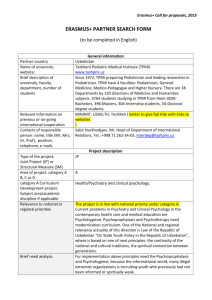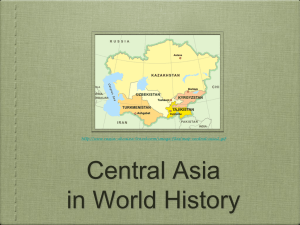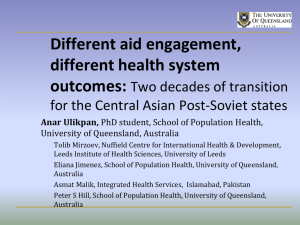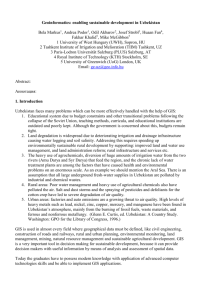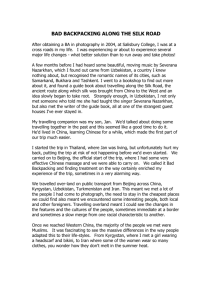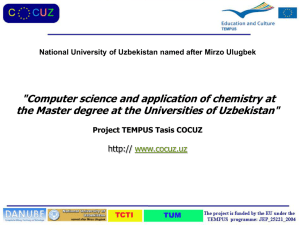"Sergo-Dental" Ltd
advertisement
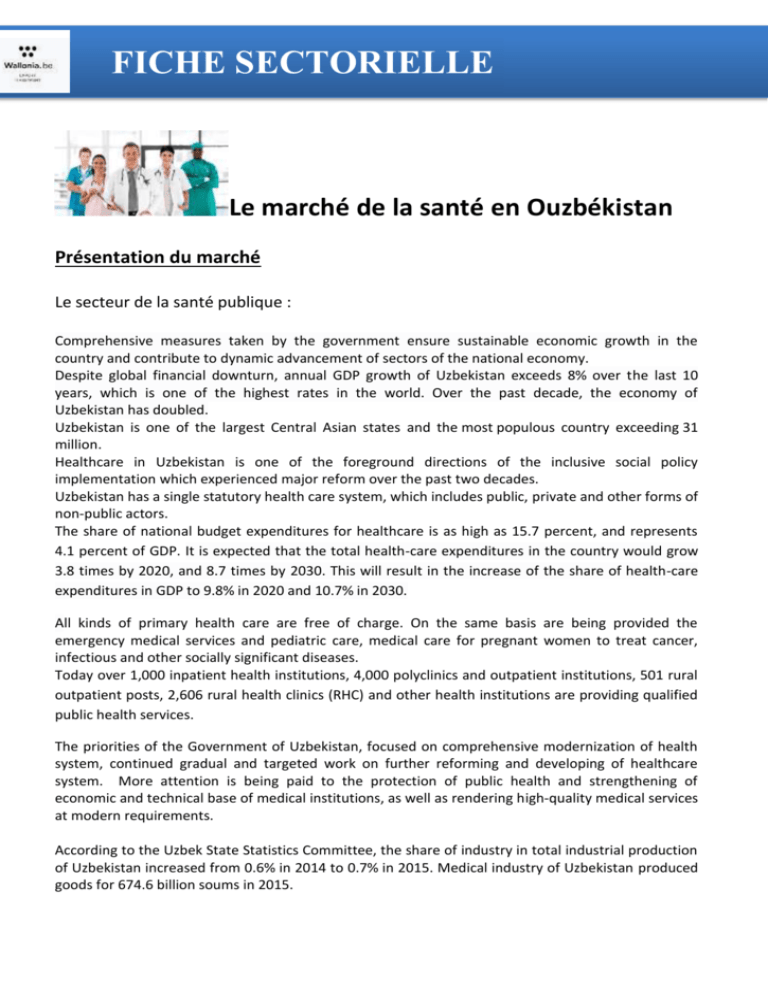
FICHE SECTORIELLE Le marché de la santé en Ouzbékistan Présentation du marché Le secteur de la santé publique : Comprehensive measures taken by the government ensure sustainable economic growth in the country and contribute to dynamic advancement of sectors of the national economy. Despite global financial downturn, annual GDP growth of Uzbekistan exceeds 8% over the last 10 years, which is one of the highest rates in the world. Over the past decade, the economy of Uzbekistan has doubled. Uzbekistan is one of the largest Central Asian states and the most populous country exceeding 31 million. Healthcare in Uzbekistan is one of the foreground directions of the inclusive social policy implementation which experienced major reform over the past two decades. Uzbekistan has a single statutory health care system, which includes public, private and other forms of non-public actors. The share of national budget expenditures for healthcare is as high as 15.7 percent, and represents 4.1 percent of GDP. It is expected that the total health-care expenditures in the country would grow 3.8 times by 2020, and 8.7 times by 2030. This will result in the increase of the share of health-care expenditures in GDP to 9.8% in 2020 and 10.7% in 2030. All kinds of primary health care are free of charge. On the same basis are being provided the emergency medical services and pediatric care, medical care for pregnant women to treat cancer, infectious and other socially significant diseases. Today over 1,000 inpatient health institutions, 4,000 polyclinics and outpatient institutions, 501 rural outpatient posts, 2,606 rural health clinics (RHC) and other health institutions are providing qualified public health services. The priorities of the Government of Uzbekistan, focused on comprehensive modernization of health system, continued gradual and targeted work on further reforming and developing of healthcare system. More attention is being paid to the protection of public health and strengthening of economic and technical base of medical institutions, as well as rendering high-quality medical services at modern requirements. According to the Uzbek State Statistics Committee, the share of industry in total industrial production of Uzbekistan increased from 0.6% in 2014 to 0.7% in 2015. Medical industry of Uzbekistan produced goods for 674.6 billion soums in 2015. FICHE SECTORIELLE In 2015, the large enterprises of the sector increased production of such products as: glass ampules for transportation or packing of goods (by 2.8 times), pro-vitamins, vitamins and their derivatives (2,3 times), medicaments, containing no hormones or antibiotics (1.3 times), etc. The largest volume of industrial products was produced by enterprises of Tashkent city (56.4% of total industry) and Tashkent region (20.4%). The small businesses of Uzbekistan increased production by 1.4 times year-on-year in 2015. Their share in the total volume of produced goods in the medical industry reached 64.3%. Currently, Uzbekistan has 267 industrial enterprises in medical industry, of which 64 were created in 2015. The country features high natural demographic growth rates, which total 1-1.5% per annum according to the projections. Approximately 615,000 newborns are expected annually in the next five years, whereas, 607,800 are expected annually in 2015-2020, and 596,700 annually in 2020-2025. Also absolute growth of the number of the elderly is expected thanks to the improvement of health services and better living standards. These factors lead to higher demand for new technologies, modern equipment and high quality medications essential for treatment of pediatric diseases, mandatory vaccination of newborns and children, and treatment of diseases typical for the elderly – cardiovascular, oncologic, and neurological diseases. Primary health care institutions are planned to reach international standards in the level of their equipment within the framework of “Health-3” project by the year 2018. This will promote improvement in the quality of medical services at rural health units, family policlinics, central district and municipal out-patient hospitals, as well as hospital care at municipal and district associations. It has been envisaged to provide 517 medical establishments with modern medical equipment and equipment for utilization of wastes and furniture. The list has been determined on the basis of time sheet for fitting out medical establishments of the district and municipal levels. This will enable to create conditions for full coverage of rural and urban population with quality medical care at the level of primary out-patient and in-patient establishments. It is planned to furnish medical institutions covered by the project, to the amount of $40 million. This will include X-ray equipment, dental equipment, vehicles for medical establishments located in remote and hard-to-reach areas. It is also planned to procure medical and laboratory furniture, sets of instruments, diagnostic and eye-care equipment and computers. Oncology institutions are getting prepared for the installation of new equipment. New buildings are being built for Syrdarya and Jizzakh specialized clinics; those in other regions are under reconstruction. The first deliveries of equipment under the joint project of the Ministry of Health and the Islamic Development Bank are expected in the coming months. Diagnostic service will be strengthened, as well. For the first time all cancer clinics will be provided with CT scanners, PCR analyzers, reagents and kits for immunohistochemical studies and identification of tumor markers, as well as mammography devices for screening centers for early detection of women breast cancer. Modern radiotherapy equipment is to be installed in all cancer treatment institutions. The cancer service will be provided with dosimetry equipment, gamma-therapeutic devices for remote irradiation, devices and those for intracavitary gamma-therapy. FICHE SECTORIELLE Besides, Uzbekistan will have two additional linear accelerators: one will be installed at the National Cancer Research Center, and the other - at the Tashkent Municipal Cancer Clinic. This would raise the diagnostic accuracy and early detection of malignant tumors at times, and also develop a preventive service. Besides, it is projected to upgrade the stock of digital X-ray machines, ultrasonic scanners, laparoscopy, duadenofibroscopy, colonofibroscopy, bronchofibroscopy devices. The package of projects of the Ministry of Health on to equipping outfit health facilities with modern equipment is fairly big as it includes both ongoing and projecting prospective ideas. Jointly with KfW Bank, the Ministry is implementing a project on the provision to the Republican Specialized Center of Cardiology with high-tech equipment. The equipment hardware valued at $3.7 million to be delivered in the years to come. Another project scheme is carried out in cooperation with the Saudi Development Fund. $20 million of loan funds will be used to purchase up-to-date equipment for the republican specialized centers of urology, eye microsurgery, surgery, dermatology and venereology, endocrinology, therapy and medical rehabilitation in 2014-2017. The list of health facilities will be likely expanded in the course of the implementation of the project. Experts are currently working on the projects schemes on to equipping regional diversified medical centers for adults that are regional medical institutions. A project on supply for urology departments of the artificial kidney devices was launched last year. There are several large-scale projects for creating ventures with foreign partners on complex equipping of all units of these institutions. For instance, under the joint project with KfW Bank, the Andijan medical center will be equipped this year. Strengthening of the logistical capacities is also a part of the programs aimed at the development of psychiatric and tuberculosis institutions. New equipment will be delivered both to the republican and regional provincial medical institutions. http://www.worldbank.org/projects/P113349/health-system-improvementproject?lang=en&tab=procurement&subTab=notices The Uzbek market for medical technology is almost entirely carried by imports. Also due to the increasing importance of private medical services, the demand for industry products is growing. Uzbek government approved projects to develop by 2017 of health care services in rural areas to a total value of 5.2 billion soms ($ 2.5 million at the exchange rate of the Central Bank of the country). In particular, organization on the basis of 228 rural health facilities of paid medical, dental services, phytobars and branch pharmacies of "Dori-Darmon" including therapeutic services. FICHE SECTORIELLE The central government's investment program includes the construction of new and modernization of existing medical objects. The program of modernization, technical and technological re-tooling of pharmaceutical companies focused on consistent reduction of country’s dependence on imports of medical drugs through more comprehensive use of own manufacturing capacity, inputs, scientific potential, and establishment of new pharmaceutical companies utilizing modern technologies. Planned investment and loan projects of the Ministry of Health (2015-2018) • Procurement of diagnostic and medical equipment in all regional multi-profile medical centers Surkhandarya, Andijan, Bukhara, Navoi, Rep of Karakalpakstan (KfW) - 45,5 mill. US$ • Procurement of radiotherapy equipment for Oncological Service of Uzbekistan (Islamic Development Bank loan) – 37 mill US$ • Procurement of modern medical equipment for Republican Specialized Centers (source not identified) – 28 mill. US$ • Procurement of modern medical equipment for district and city health facilities (loan requested from Export-Import Bank of Korea) – 40 mill. US$ • Procurement of x-ray machines and fluorography devices for outpatient services of Tashkent City (loan requested from Export-Import Bank of Hungary) • Procurement of equipment for Medical University Clinics and Republican Clinical Hospitals (source not identified) – 15 mill US$ • Procurement of laboratory equipment for Sanitary Inspection Centers (source not identified) – 30 mill US$ • Procurement of equipment for emergency ambulance services and emergency medical care (source not identified) – 6 mill. US$ Le secteur pharmaceutique : Along with demographic growth, longer life expectancy, and increasing aging of population, and advancement of public health system, inter alia, thanks to the growth of health institutions, the need for medical drugs is increasing. Thus, the pharmaceutical sector has major development prospects. At present time pharmaceutical market in Uzbekistan is one of the fast growing among CIS countries. In recent years several regulations have been adopted that clearly regulating this sphere of activity. In future it is expected to increase the volume of industrial production in three times and export - by 2.2 times. Pharmaceutical market of Uzbekistan is about 80% dependent on imported drugs. At the present time imported pharmaceuticals currently provide from 60% to 95% of the market in various segments. It is expected that in the next 5 years import of medicines will increase each year by 20-22% roughly. Uzbekistan also exports drugs exclusively to CIS countries and every year export is also expected to increase by 20% yearly. In the currently existing growth of domestic demand for medicines pharmaceutical market should reach in coming years the mark of $ 1 billion. FICHE SECTORIELLE Today, the pharmaceutical industry of Uzbekistan is represented by more than 561 wholesale companies licensed to pharmaceutical activities such as wholesale of medicines and medicinal products. There are 4 932 retail drugstores in Uzbekistan. It should be noted that to date, 1447 medicines in 90 pharmacotherapeutic groups and 30 dosage forms, including antihypertensive agents, antispasmodics, vitamins, biostimulants, analgesics, anesthetics, antibiotics, anti-TB drugs, antiseptics, antiparasitic medicines, vaccines, serums and other drugs have been registered in the republic. Generally Uzbekistan imports medicinal products from Ukraine, Russia, India, Hungary, China, Switzerland, France and Germany… In general, the products are imported from 57 countries. Still foreign manufacturers dominate on the pharmaceutical market. Production of such companies as “Berlin Chemie/ Menarine Pharma” (Italy), «Novartis» (Switzerland), “Sanofi-Aventis” (France), etc. are in high demand. The mostly imported drugs in Uzbekistan are antimicrobial medicines, antibiotics, antibiotics of cephalosporin, analgesics and antipyretics, anti-bacterial agents, expectorant drugs and other widely consumed drugs. The most important pharmaceutical companies are interested in importing of consumables which could be used in medicine and dentistry. There is also a demand in technologic, laboratory equipment. Pharmaceutical companies are also looking for parapharmaceutical products, e.g. hygiene means, baby products. Preventive health actions will have an impact on trends and composition of demand in the pharmaceutical market. Inter alia, development of early diagnosis and diagnostics activities in general will increase the demand for substances needed for laboratory tests and so on. With the emergence of healthy lifestyle, consumption of drugs, which promote disease prevention, will be expanded. Pharmaceutical sales in Uzbekistan will continue to expand, creating opportunities for drugmakers. Meanwhile, the Uzbek government will continue to improve the domestic business environment through regulatory developments, privatisation and the promotion of foreign direct investment, which will benefit investments that enhance drug manufacturing and operations in the country. However, the regional economic slowdown and a challenging operating environment will continue to weigh on Uzbekistan's pharmaceutical and healthcare sector growth potential, keeping a lid on its attractiveness to investors. In general, in 2015-2018 foresees the implementation of 55 investment projects for the creation of large pharmaceutical enterprises in all regions. Currently, the industry developed and implements a program of measures on attracting foreign investments to the projects, related to production of medicaments for TB, cancer, heart diseases, etc. The capacities in pharmaceutical industry allows to produce medicaments on 30 forms and 96 pharmacotherapy groups of medicaments. Most domestically manufactured medical drugs are generics, produced mostly from imported substances. More than 86% of domestic medical drugs are manufactured fully (14%) or mostly (72%) FICHE SECTORIELLE from imported substances, which currently makes domestic production of medications utterly dependant on imports, their quality, and prices. In spite of the relatively rapid growth of the pharmaceutical industry in Uzbekistan, further development of this sector is essential. Among the priorities is creation of medicines based on local raw materials. Uzbekistan is rich with many kinds of medicinal herbs. There are 138 families, 1023 genera and 4500 kinds of herbs (including 1150 medicinal). This allows producing original medicines and dietary supplements based on local raw materials. Project of the SJSC Uzpharmsanoat for the production of medications based on medicinal herbs is meant for three years. It is planned to allocate 10 million hectares of land associated with forestry under the ownership of farms. Plantations will be created in each region of the country, and pharmaceutical companies start operating in the fields launched with the involvement of foreign investment. Production is scheduled for the end of this year and beginning of 2016. From 2015 to 2017 JSC “Dori-Darmon” plans to implement 65 projects for processing factories of medicinal plants and shops on their packaging. For these purposes it will be spent 12.2 million dollars. “Dori-Darmon” JSC is a major state distributor, with extensive network of pharmacies nationwide. JSC “Dori-Darmon” and its subdivisions are the main suppliers of drugs in medical institutions of Ministry of Health, Ministry of Defense, Ministry of Internal Affairs, National Security Service and other medical institutions of the Republic (www.doridarmon.uz). The Company consists of 8 joint-stock companies and 10 subsidiaries with 17 warehouses, 15 analytical laboratories and 1328 pharmacies located in all regions of the country. More than 76% of retail outlets work in rural areas, including 718 branches working in rural medical stations. Furthermore, there are mobile pharmacies – special vehicles with isothermal wagon with essential equipment operating in remote areas with the mandate to supply medications to the rural households in all oblasts of Uzbekistan. All drugs imported to the country should be registered with the Pharmacological Committee of the Health Ministry http://www.pharm-reg.uz/ to be marketable in Uzbekistan. Pharmaceuticals must meet the following requirements to be registered in Uzbekistan: All products must have a safety certificate from its country of origin All products must also have a registration certificate from the Pharmacological Committee of the Ministry of Public Health of Uzbekistan. There are special laboratories for pharmaceutical quality control which have been established by the customs department. These laboratories control pharmaceuticals which are being imported into the territory of the country and certify their compliance with proper quality standards. A sample of each type of pharmaceuticals which arrives at the customs warehouse must be sent to the central laboratory of control and analysis. The laboratory is operated by the State Joint-Stock Company "Dori-Darmon". Exempt of VAT and custom duties: FICHE SECTORIELLE Import of raw materials for pharmaceutical production; Technologic equipment; Settled technologic equipment is exempt of property tax for 2 years. http://uzpharm-control.uz/ Registration is a key point in the system of finished pharmaceutical products circulation. Process of medicines registration in Uzbekistan: 1. Foreign manufacturing-firm that wants to register its production in Uzbekistan sends a letter – presentation in 2 copies to the Chief Board of medicines and medical equipment quality control. 2. Manufacturing-firm submits documents and samples depending on the medicine. 3. After documents and samples submission, the applying firm and State Center of medicines expertise and standardization conclude a contract. 4. Chief Directorate sends documents to Pharmacological Committee, Pharmacopoeia Committee, Drugs Control Committee, State Center of medicines expertise and standardization, medical, prophylactic and diagnostic devices and medical equipment registration Bureau. 5. After implementation of necessary procedures on documents and samples checking, the decision on medicine registration is made. It is decided by the expert board of Chief Directorate on medicines and medical equipment quality control. 6. After that Registration Bureau on the base of permission of the Directorate finalizes official registration certificate within 10 days. Time period, required for registration, depends on many factors, first of all – on the medicine class, but on the average it takes about a year for generic registration, registration of original drug may last several years because it requires clinical trials organization. Regulatory requirement in Uzbekistan is availability of medicine’s registration in other countries of the world excluding manufacturing country; otherwise clinical trials on the territory of Uzbekistan are assigned. For medicine registration in Uzbekistan the following documents are required: 1. Letter of application. The following documents are attached to the letter: Registration application in standard form– 2 (or 3) copies; Registration dossier – 2 (or 3) copies; Samples of medicine, at sufficient amount for 3-fold analysis by methods, described in regulative documents, substances (active agents); Reference-standards, standards samples of medicines, foreign impurities, and specific chemical agents, necessary for the analysis. 2. Translated documents of the manufacturer (producer) in foreign languages shall be legalized according to the legislation of Side, in which state registration is implemented. Registration process is very complex and it takes definite time. Registration is valid within 5 years; upon the expiry of it the medicine shall be re-registered. FICHE SECTORIELLE In such cases hiring registration specialist or consulting firm involved in registration of medicinal products becomes an advantage. This firm will be a mediator between you and regulatory body. In such companies registration manager or specialist are in charge for work. http://www.neopass.uz/downloads/registration%20documents_uzb.pdf http://www.uzmedexport.uz/register_en.html Dental health care Dentistry in Uzbekistan is developing at the same level as science and medicine around the world. There are growing capabilities for the provision of highly qualified dental services and the effective treatment of tooth, gum and oral cavity disease. Ministry of Health of the Republic of Uzbekistan in the framework of the project “Health-3″ planned to purchase 942 dental units with all necessary accessories, which will be equipped in all state medical institutions of the country. Children’s dental service is assigned a special part. It is planned to complete equipping of children’s dental rooms at all multisectoral urban and district polyclinics in 2014-2017. Generally, dental health care in the public sector consists of dental surgeries in rural areas, and dental polyclinics and specialized inpatient clinics in urban areas. However, nowadays dental services which are provided in Uzbekistan are being restructured. Instead of big specialized clinics it is planned to organize small rooms in all public health facilities. A wide network of private dental clinics is operating in the Uzbekistan. There are 107 dental clinics in Uzbekistan including more than 50 large and small dental practices in Tashkent. To have private practice it is necessary to get the licenses from the Ministry of Health of Uzbekistan. First-class dental clinics are equipped with modern equipment and tools made by the world's leading producers on dental market: «KaVo» (Germany), «Dentsply» (USA), «Gendex» (Italy), «Bego» (Germany), «Renfert» (Germany) etc. The clinics have their own dental labs, x-ray rooms, equipped with high-precision and computerized equipment, such as: panoramic pantomografs, digital radiography, digital x-ray, high quality materials and effective anesthetics. In Uzbekistan, more and more dental institutions are interested in modern equipment & instruments, using the latest technologies and developing advanced methods of diagnosis and treatment, consumables, dental laboratories, IT for dental clinics, disposables & instruments for plastic surgery etc. Companies-distributors of dental equipment in Uzbekistan: FICHE SECTORIELLE Wholesale firm "Sergo-Dental" Ltd (www.sergo-dental.com) Wholesale firm "As-Farm" PE (www.asfarm.uz) Wholesale firm "Ab Form Sistem" Ltd (www.abform.uz) Wholesale firm "Intermed Innovation" JV Ltd (www.imed.uz) Wholesale firm "Tibbiyot Impeks" Ltsd Wholesale firm "Shifo-Nur-Servis" Wholesale firm "Sarus Biznes Servis" Ltd (www.sarus.uz) Wholesale firm "Luch Stom Interprise" Ltd Wholesale firm "Biostom" Ltd Wholesale firm "Benetek-Impeks" Ltd Dental education is provided by Tashkent State Dental Institute created on the basis of dental faculty of the Tashkent Medical Academy. Many Uzbek dentists are trained abroad to provide patients with high quality dentistry services. In the meantime, the prices for the services in Uzbekistan are much cheaper in comparison with Western and Russian clinics. Les soins de santés privés: A number of governmental documents for the development of private entrepreneurship have been adopted in the country. They have given an opportunity to develop the system of private medicine which is the lowest layer in the hierarchy of the Uzbek health system and still in the process of developing. There are about 4,500 private medical centers in Uzbekistan now. Private and other forms of nonpublic actors in the health sector comprise pharmacies, physicians working in single practices, and institutions involved in health care delivery or the production and supply of pharmaceuticals or medical equipment. The private clinics and medical centers are equipped with modern equipment to render qualified medical services to the people, whereas state-run establishments still employ old equipment. Administratively, they are accountable to the local governments, while financial accountability lies with the local tax departments, to which private providers are required to submit regular financial reports. Private providers are subject to the regulations of “for-profit” (profit-making) entities. Little public funding is directed towards private health care providers. Private funding is obtained through the delivery of services outside the state-guaranteed basic benefits package of medical services. Financing flows from external sources to the private sector, for which no protocols on expenditure and use of health resources exist. Private health care providers are exempted from all types of taxes for the first two years, provided they use these savings for investment in their medical and diagnostic equipment. Health care professionals in Uzbekistan are paid differently; it depends on whether they work in the public or the private sectors. Private health care companies establish salary structures themselves, so that payment mechanisms and salary levels differ from company to company. This is also the case for FICHE SECTORIELLE individual private practices in their employment of health professionals. Reliable data on the private sector are not available. L’infrastructure et les opérateurs du marché de la santé The Ministry of Health of the Republic of Uzbekistan (www.minzdrav.uz/en/) is the central organ for state management of health care and subordinates its activities to the Cabinet of Ministers of the Republic of Uzbekistan. In recent years, primary health care in Uzbekistan has seen dramatic changes in organization, management and financing. The Soviet multi-tiered system of primary care is being replaced by a twotiered system, consisting in rural areas of rural physician points (SVPs) and outpatient clinics of central rayon hospitals. Uzbekistan: Public Healthcare System National level : Higher medical educational institutions, high schools Specialized centers Republican Hospitals Secondary level : Regional medical facilities (Regional Multi Profile Hospitals) Primary level : District medical associations City medical associations Facilities providing outpatient medical care in policlinics (outpatient units) Today over 1,000 inpatient health institutions, 4,000 polyclinics and outpatient institutions, 501 rural outpatient posts, 2,606 rural health clinics (RHC) and other health institutions are providing qualified public health services. Four specialized Republican medical centers of surgery, cardiology, microsurgery and urology are successfully operating in Uzbekistan. The branch of a specialized center of urology,the centers of cardiology and microsurgery has been also established in the Khorezm Province. Healthcare System - Types and methods of procurement Tendering Committee Inter-agency committee Working group (MoH’s department) O’zmedexport Group of project realisation FICHE SECTORIELLE Uztibtechnika Depending on volume, range and type of goods to be purchased, one of the following methods of procurement is applied: • International Competitive Bidding (open tenders); • Limited International Bidding (closed tenders); • National Competitive Bidding (NCB); • Shopping; • Direct Contract Signing Exempt of VAT and custom duties: Import of raw materials for pharmaceutical production; Technologic equipment; Settled technologic equipment is exempt of property tax for 2 years. UzPharmsanoat State Joint-stock Concern, established in June 1993 based on the Decree of the President of Uzbekistan, is the lead industrial association of pharmaceutical companies.Currently UzPharmsanoat unites 92 pharmaceutical companies or 60% of all companies in the sector. The concern includes research institutions and associations, manufacturing companies of all ownership forms, including joint ventures with foreign investments, joint-stock companies with majority share of private investments. There are 8 research institutions (Tashkent Research Institute of Vaccines and Sera, Uzbek Chemical and Pharmaceutical Research Institute, Institute of Chemistry of Vegetable Substance, Institute of Bioorganic Chemistry, Institute of Chemistry and Physics of Polymers, Botanika R&D Center, Oriental Medicine Research Institute, Vaktsina NPO), with 797 staff, of which 75 are doctors of sciences, 207 are candidates for doctors of sciences. There is Tashkent Pharmaceutical Institute, which annually trains more than 200 pharmacists and industrial pharmacea experts. There are medical drug and industrial pharmaceutical units at 51 medical colleges, which annually train more than 2000 mid-level health workers. The information on the main players dealing with pharmaceuticals in Uzbekistan is provided in the attached profiles of the companies: Uzmedexport www.uzmedexport.uz) SJSC Dori-Darmon (www.doridarmon.uz) Asklepiy (www.asklepiy.uz) Oxy-Med (www.oxymed.uz) ATM-Partners (www.atm-partners.uz) Lahisam (www.lahisam.uz) Jurabek (www.jurabek.uz) FICHE SECTORIELLE Foires en Ouzbékistan EXHIBITIONS : To find potential partners the companies may visit the following exhibitions to be organized in Uzbekistan in 2016 : Tashkent International Healthcare Exhibition TIHE 19-21 April 2016 www.tihe.uz AptekaExpo 19-21 April 2016 www.tihe.uz "Stomatology Uzbekistan” 19-21 April 2016 www.tihe.uz Useful references : www.minzdrav.uz www.pharm-reg.uz/ www.undp.uz http://www.worldbank.org/en/country/uzbekistan http://apteka.uz/orgs/type/2090 Auteur : Shakhnoza KARIMOVA Commercial and Economic Representation of Wallonia (Belgium) AWEX in Uzbekistan tachkent@awex-wallonia.com www.awex.be
